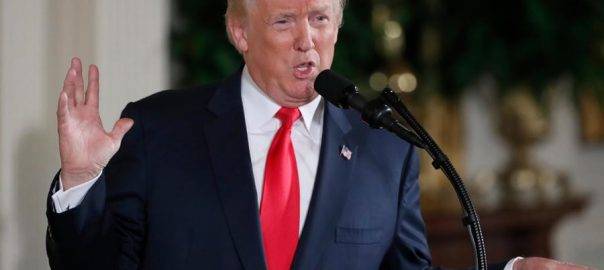Trump promises to ‘figure it out’ with S Korea’s moon
Shares

SEOUL: US President Donald Trump arrived in Seoul Tuesday vowing to “figure it all out” with his South Korean counterpart Moon Jae-In, despite the two allies’ differences on how to deal with the nuclear-armed North.
As tensions over Pyongyang’s weapons programme have soared, the US president has traded personal insults and threats of war with North Korean leader Kim Jong-Un, but the South’s capital and its 10 million inhabitants would be on the front line of any conflict.
“Getting ready to leave for South Korea and meetings with President Moon, a fine gentleman,” Trump tweeted early Tuesday from Japan, the first stop on his Asian tour, adding: “We will figure it all out!”
The tone was in marked contrast to a previous Trump tweet in which he accused Moon — who has backed engagement with the North to bring it to the negotiating table — of “appeasement”.
Trump walked down the steps of Air Force One at Osan air base outside Seoul accompanied by the First Lady, and was welcomed by South Korean foreign minister Kang Kyung-Wha.
The US president flew in from Japan after securing Tokyo’s full support for Washington’s stance that “all options are on the table” regarding Pyongyang, and declaring its nuclear ambitions “a threat to the civilised world and international peace and stability”.
He enjoyed three days of near-bromance with Prime Minister Shinzo Abe, calling him “wonderful” after a round of golf and describing US-Japan ties as “really extraordinary”.
Trump’s relationship with Moon, a former human rights lawyer, is noticeably cooler, stoking concerns about the decades-old alliance and fears in Seoul that it could be sidelined by the US in favour of Tokyo.
South Korea is rolling out the red carpet for Trump as it seeks messages of assurance about the alliance and US resolve.
At the same time, while Trump has threatened Pyongyang with “fire and fury”, Moon is mindful that much of Seoul is within range of the North’s artillery and in an address to parliament last week demanded: “There should be no military action on the peninsula without our prior consent.”
In an editorial Tuesday ahead of Trump’s arrival, the Korea Times said of the US president: “His ‘rhetorical bombs’ say it all.”
“However calm Koreans are reported to be about the Trump-Kim war of words, we cherish our lives as much as Americans do theirs and feel scared by the outlook of war,” it added.
Kim Hyun-Wook, a professor at the Korea National Diplomatic Academy, told AFP that the two allies have “subtle differences in their positions” and underlying suspicions about each other.
‘Reckless remarks’
Citizens views are mixed, with both “No Trump” and “Welcome President Trump” demonstrations taking place in downtown Seoul since the weekend, sometimes only a few blocks apart.
North Korea — which carried out by far its most powerful nuclear test to date in September — itself welcomed Trump to the region with a rhetorical volley via the ruling party newspaper Rodong Sinmun, warning a “spiritually instable” president against making “reckless remarks”.
Another issue will be trade between the two nations, with Trump expected to bring up the renegotiation of the five-year-old US-Korea free trade agreement which he has called a “horrible deal” and a “job killer”.
His first stop in the South will be Camp Humphreys, where US forces stationed in the country have moved their headquarters from downtown Seoul.
Later he will have a summit with Moon at the Blue House, followed by a lavish dinner with live concerts by both Korean traditional musicians and K-pop artists.
On Wednesday, Trump will speak to South Korean MPs but his visit will not include a trip to the Demilitarized Zone dividing the Korean peninsula, with the administration downplaying the destination as “a little bit of a cliche”.
Some observers have fretted that a gaffe by a president given to off-the-cuff remarks could send tensions rising on the peninsula.
“If Trump says anything that can provoke North Korea, it could send military tensions soaring again,” said professor Koo Kab-Woo from the University of North Korean Studies in Seoul.
